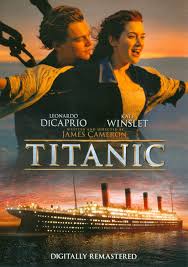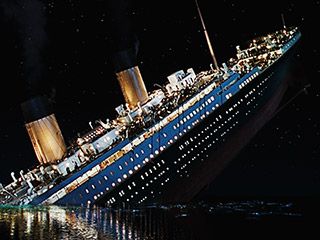EXTRACTS ( full version here)
One song from Tempest which deals with death and destruction but which has a fantastical but also somewhat whimsical humorous quality is the title track. This is a fourteen minute ‘epic’ consisting of fifty verses, all sung to the tune of a vaguely ‘Celtic’ waltz. The song was released in 2012 – a hundred years after the sinking of the Titanic – probably the most famous and dramatic shipwreck in history. The event was a huge news sensation at the time and created massive worldwide interest. Since then many books, articles and films have related versions of a story which has always retained its power to move audiences, especially as the ship was regarded as ‘unsinkable’. Its destruction by an iceberg on its maiden voyage to the USA has since become a symbol of the end of an era of deference towards the upper classes and of the kind of cultural blindness that led the world into the dreadful carnage of World War One. The 1997 blockbuster Titanic directed by James Cameron and starring Leonardo Di Caprio and Kate Winslet as Jack and Rose, two fictional ‘star crossed lovers’, became one of the most commercially successful movies of all time. The theme tune, a lachrymose power ballad belted out by Celine Dion called My Heart Will Go On (1997), became a huge worldwide hit.

The song is entirely composed of four line stanzas, each of which has exactly eight syllables. The choice of this format appears to be deliberate. In the manner of a traditional ballad, there are no choruses or bridge sections. Many such songs were written and performed, some in the immediate wake of the event, and many others over the next few decades, by popular singers as well as blues and country artists. Among the most well known was Ernest ‘Pop’ Stoneman’s The Sinking of the Titanic (1926), which contains the refrain …It was sad when the great ship went down… This was used in several subsequent versions of the song, including one by Woody Guthrie. This version tells the story in a straightforward way, although it does emphasise that …The rich they declared they would not ride with the poor/ So they sent the poor below… Frank Hutchinson, a white blues singer, produced a kind of early ‘talkin’ blues’ version. ‘Hi’ Henry Brown’s Titanic Blues (1932) relates the story with a kind of po-faced relish. Many blues singers commented on the fact that Titanic supposedly did not allow black passengers to board; some even hinting at the sinking thus being a kind of divine retribution. A legend had grown up that the great black boxer Jack Johnson had been denied passage on the ship. This is recounted very sarcastically in Leadbelly’s The Titanic (1948), which includes the lines: …Jack Johnson want to get on board/ Captain said, “I ain’t hauling no coal”… What is surprising about many of these songs is that, instead of being tragic laments, they are often pithy and satirically humorous commentaries on an event which had already taken on iconic significance.

There is an even more surprising shift in the next verse. If we are expecting the song to be any kind of serious spiritual discourse we are about to be disillusioned …Leo took his sketch book/ He was often so inclined/ He closed his eyes and painted/ The scenery in his mind… There is no doubt here that the character being described is one of the two main protagonists of the movie. Dylan refers to him not as ‘Jack’ (the character’s name) but as ‘Leo’, a jokily abbreviated form of Leonardo (as in Di Caprio). In the film, Jack Dawson is a poor artist who in one scene sketches the beautiful and aristocratic Rose in the nude, which leads onto a ‘steamy’ erotic encounter. But Dylan tells a different tale. ‘Cupid’ (the God of love in classical mythology) shoots an arrow into ‘Leo’ and he immediately ‘falls into the lap’ of the nearest woman. Already the events of the song appear to have merged with the Watchman’s dream. Events now take place with dream-like rapidity and logic. Suddenly Leo discovers that the ship is flooding, then we learn that the ‘smokestack is leaning sideways’ as …heavy feet begin to pound… while Leo …walks into a whirlwind… The real Titanic did not, of course, encounter a whirlwind or a ‘tempest’.



Leave a Reply